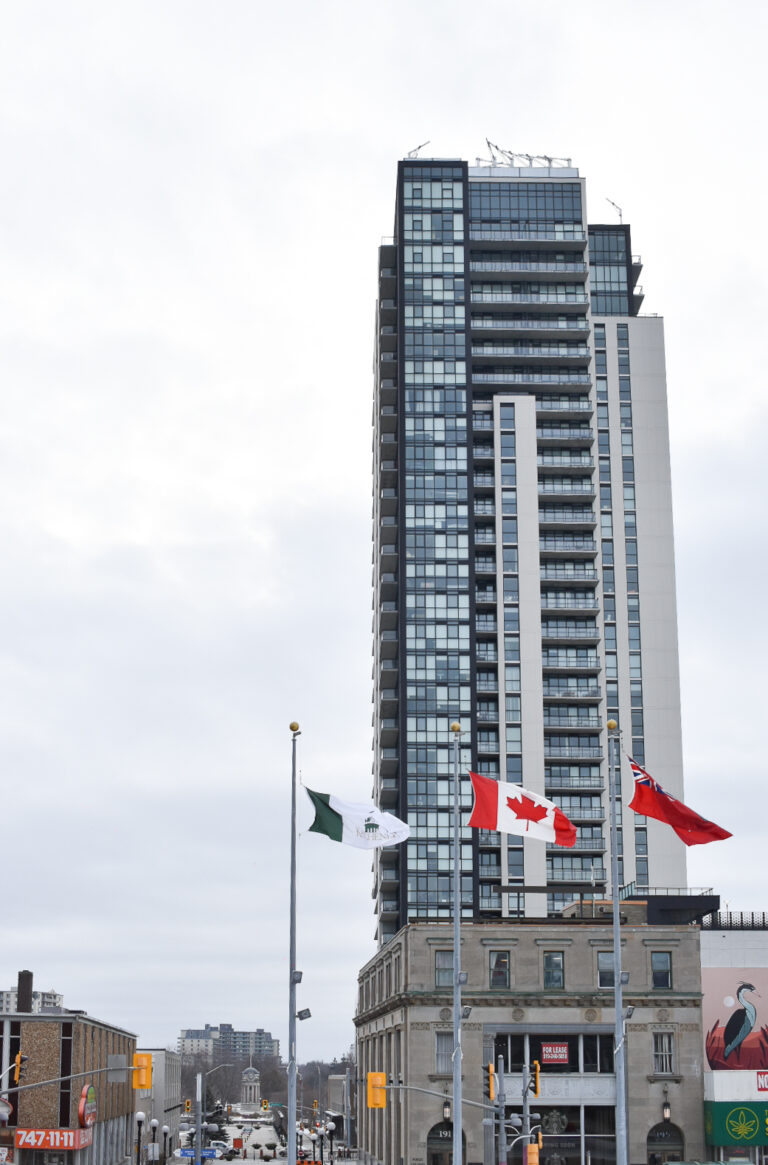With the need for housing constantly growing in the region, the 2024 City of Kitchener budget emphasizes a need for more infrastructure.
If there is growth in housing, there must be infrastructure to supplement that growth. However, several factors stand in the way of Kitchener’s development plans.
“Recent changes to the Development Charges Act, under Provincial Bill 23, has the potential to make funding new infrastructure more difficult,” the budget states.
Bill 23, the More Homes Built Faster Act, is a plan from the provincial government to build 1.5 million homes by 2032, but it instates policies that disregard the realities of housing insecurity across Ontario.
The bill neglects affordable housing as it does not allow developmental charges, which are fees collected from developers to pay for needed infrastructure when building permits are approved, to be utilized for housing.
Also, the provincial government considers affordable housing as units which are less than 80 per cent of what an average market value home costs. To give an example, in 2023, the average cost of a home in Kitchener was $670,000, so a home that is $536,000 or less is considered affordable by the provincial government.
Finally, by this definition, “affordable” housing is a fluctuating definition based on market value, not individual incomes. If Bill 23 was around in 2021, affordable housing would be defined as being $605,000 because the average housing price was nearly $800,000.
Now, how does this impact the budget for 2024? Kitchener expects a growth of 5,000 new residents year over year, which is extremely conservative. Kitchener has signed the province’s pledge to support the facilitation of Bill 23, as Kitchener would like to build 31,000 homes by 2031. With a growth of 5,000 residents per year, and seven years left in this pledge, that leaves 35,000 new residents and only 31,000 homes.
We aren’t even considering the unhoused population, those who are facing housing insecurity, or those who cannot afford these homes.
“…[there is a] combined annual increase of $124 for the average household, based on the average assessed value of $326,000,” the budget states.
Well, most households in Kitchener are not valued at $326,000—rather, the average home was priced at $670,000 in 2023.
This lack of transparency is alarming, and evaluating tax hikes based on unrealistic numbers effectively overlooks the realities that taxpayers will face.
The budget mentions the Housing for All Strategy, launched in 2020, aiming to build 9,300 affordable units to address the over 6,000 households waiting to find community housing.
The budget states that the city will contribute $1.2 million to further implement the Housing for All Strategy, but also states it will contribute $200,000 to the implementation of the strategy (25-26). This budget does not explicitly state what that will go towards, but this funding is merely a drop in the bucket as the city continues to be a provincial trail-blazer in housing unaffordability.
Nonetheless, with all this growth and the disillusionment of the municipal government toward the realities of those who struggle with housing insecurity, it does not look like the draft budget for 2024 in the City of Kitchener is either well-thought-out or transparent.
Although one might want to remain optimistic for the New Year, it seems like the demand for housing should have been addressed pre-emptivitely.
Nimbyism, an attitude which refers to the opposition of development proposals by residents, may be to blame for the gruelingly slow process to address housing needs. However, there is indeed a beacon of light in this predicament.
The Plan to End Chronic Homelessness (The Plan) launched by the Social Development Centre Waterloo Region, the Region of Waterloo Community Services and Housing recently presented a plan which asks for $14 million dollars to curb current and dramatically increasing homelessness in the region.
The Plan is an informed and well-researched roadmap that will allocate funding to communities throughout the Waterloo Region to provide housing and shelters for at-risk residents such as low income, homeless, seniors and those facing evictions.
This plan isn’t going to provide a one-time fix, but it is articulated in a manner that is realistic and is proactive about addressing the possibilities of the homeless population tripling by 2028 (4). However, the draft budget does not mention The Plan.
With the regional government proposing a draft budget that is a half-measure in addressing the adversities with Kitchener, it is time to let the innovative ideas of The Plan to take the forefront.
As someone who champions knowledge from lived experience as more fruitful than just political knowledge, I firmly believe that it is time for the municipal government to open its ears to the public, to hold themselves up to higher standards and to ensure that its residents won’t face dangerous, if not fatal, adversities as residents fall through the cracks of slow bureaucracy.

